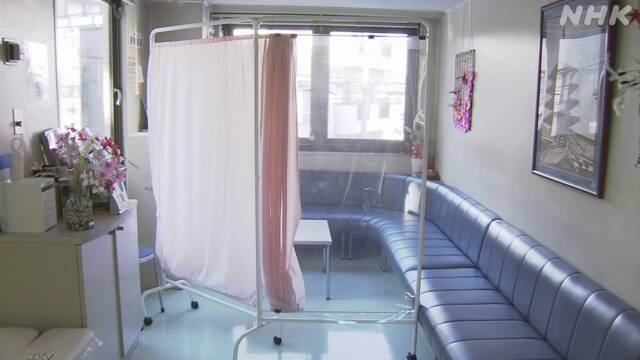As the number of people infected with the new coronavirus is declining, the hospital in Sumida Ward, Tokyo, will, in principle, target families vaccinated next week regarding the restrictions on inpatient and family visits that have continued since last year. I decided to relax from.
Sumida Chuo Hospital in Sumida Ward, Tokyo, has set up a posterior bed to accept patients who have recovered from the new coronavirus but have weak legs during hospitalization.
In order to prevent the spread of infection in hospitals, visits to inpatients and their families have been prohibited since March last year, but the restriction will be relaxed from the 15th next week due to the declining number of infected people. , Decided to resume the visit.
Doctors and nurses have repeatedly discussed the conditions of the visit, and as a general rule, for families who have been vaccinated twice, the visit is limited to 2 people at a time and the visit time is up to about 15 minutes by advance reservation system. It was decided.
In addition, basic infection control measures such as temperature measurement and ventilation immediately before are thoroughly implemented, and even families who have not been vaccinated for some reason will be allowed to visit in a shorter time of 5 to 10 minutes.
At the hospital, staff members posted a sticker informing them of the resumption of visits, and checked the status of visit places where part of the lobby was separated by transparent sheets.
The nurse who responded to the visit said, "I'm glad I was able to alleviate the change in my mood, such as the patient's facial expression changing and appetite appearing just by meeting with my family."
Kazuki Kojima said, "If you are asked if there are any uncertainties when resuming the visit, it will be a lie, and since Corona has not completely converged, we cannot remove all the regulations, but" I want to visit you. " We have been discussing with this idea. In order to protect regional medical care, we would like to continue to take measures against infection without loosening it. "
To relax visitation restrictions At the hospital, discuss conditions
At Sumida Chuo Hospital, discussions were held this week on how to alleviate the visits that had been restricted by the spread of the new coronavirus.
Based on the fact that the number of infected people is declining and the requests from patients, various opinions were expressed on what conditions should be set for resuming visits.
Regarding whether or not to require two doses of the vaccine, doctors and nurses expressed concern that "some people may not be able to receive the vaccine due to their constitution."
In addition, there was a proposal to have non-vaccinated people undergo a test and ask for a negative proof, but it was not a condition, such as "It may be a cost burden for the patient's family." ..
In the end, as a general rule, for families who have been vaccinated twice, advance reservations are required and the visitation time is limited to about 15 minutes.
On the other hand, for some reason, even families who have not been vaccinated will be allowed to visit in a shorter time of 5 to 10 minutes.
To relax restrictions at 9 hospitals in Sumida Ward
The Sumida Ward Health Center called on hospitals in the ward to relax restrictions on visits to inpatients, taking into account the fact that the infection situation is declining, and each hospital proceeded with the examination.
According to the health center, nine of the 11 hospitals in the ward that will support the new corona by the 12th have decided to relax the restrictions and resume visits.
Some hospitals require documents to confirm the presence or absence of vaccination as a condition of visits, but other hospitals confirm it verbally but do not make it an absolute requirement for visits, and basic infections. It means that there are many places where mitigation is promoted after thorough measures are taken.
Sumida Ward Health Center Director Toru Nishizuka said, "While there are requests from the residents to ease visitation restrictions, the ward thought that it was possible to achieve both infection control and recovery of daily life against the background of a high vaccination rate. Initially, some hospitals were hesitant, but we encouraged mitigation with the advice of experts. "

